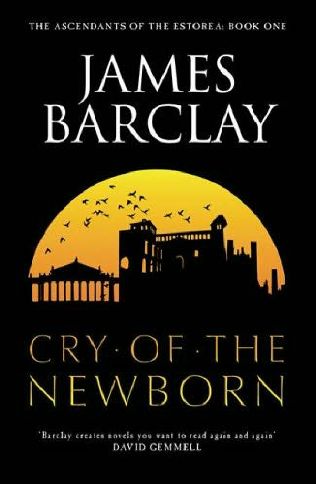
Cry of the Newborn
James Barclay
819 pages
published in 2005
James Barclay is not a writer I had heard of before I got this book out of the library. The backcover blurb sounded interesting and the frontcover sported a quote by Steven Erikson, one of my favourite fantasy writers, so while the first few pages I sampled were a bit dull I thought I'd take a chance. The library also had the sequel, but I didn't put that one up as this was big enough already; I could always get it next time. But I don't think I will. Erikson's blurb said that Cry of the Newborn was "a most extraordinary and impressively ambitious novel", but in reality it was just a bog standard epic fantasy novel. Not a bad novel by any standards, competently written certainly, but nothing special.
The story revolves around a typical fantasy prophecy, that one day humans can ascend to godhood, having the same powers as the Omniscient. This belief is however a heresy to the Order, the state church, which prosecuted and killed off all believers in this prophecy and destroyed all knowledge of it hundreds of years ago, or so it believes. The truth is otherwise, with the heretics believing in Ascendancy having gone to ground in Westfallen, a sheltered corner of the Estorian Concord where their centuries old breeding process has finally borne succes. Generation after generation managed to produce some people with special powers, but most of these powers were weak and often lost at a later age. It's only at the start of the story that the first generation of true Ascendants is born, four children with potential powers rivaling the Omniscient itself. Cry of the Newborn is the story of their coming of age, in a time when their country is in grave peril.
That country is the Estorian Concord, a sort of fantasy Roman Empire which rules a big chunk of the world and is busy conquering the remaining parts. Its ruling philosophy is that peace and prosperity can only flourish by creating unity, peacefully if possibly but forcefully otherwise. Its highly professional legions conquer other countries, which then become provinces of the Concord, their rulers replaced by a marshall defender, their religions subjugated to that of the Order. Though the Concord brings stability and peace, this of course comes at a price: not just war, but aftrwards it's the newly conquered countries that have to pay for further conquests. It's somewhat of a ponzi scheme but it works as long as the Concord doesn't bite off more than it can chew.
Which of course it does, when it invades the kingdom of Tsard, while their latest conquest, Atreska, is not yet fully digested. Over confident, several Concord armies walk into traps, while Atreska, subject to both crippling taxation from the Concord and heavy raiding from Tsard, rises up in rebellion and allies itself with Tsard. At the same time, the four Ascendant children have grown into adolescence, their powers have begun to manifest them and their existence has become known to the powers that rule Estoria. They have the potential to safe the Concord, if only it can bring itself to trust them and not see them as dangerous, heretical freaks against nature.
As I said, Cry of the Newborn is a fairly traditional epic fantasy story and one which I would have enjoyed much more where it not for two things. First, I couldn't stand the whole Ascendant plotline as the characters were so two dimensional and annoying. There's the arrogant bad apple Gorian, the dithering and slightly ditzy Mirron, as well as Arducius and Ossacer, both weakly but saintly and somewhat interchangable. Much of the storyline revolving around them is somewhat on the dull side, partially because so much of it is predictable, especially Gorian's ultimate betrayal, which had been foreshadowed almost from the start of the book.
The second objection is more fundamental. The world Barclay has created is presented as if the Concord is a force for good, described in terms which argue that the Estorian hunger for empire is not driven by base motives, but out of a noble desire to create order and stability. Trouble is, I don't buy it. Looking at it objectively, the Concord is just not that nice, happily waging wars of conquest only to then suck the conquered countries dry for further conquest, not to mention the enrichment of the Estonian elite. Sure, by author fiat there's little of the cruelity on display practised by real world empires like the Roman or British Empire and it's even fairly gender neutral, with the current ruler of the Concord being a woman, and with various viewpoint characters being female soldiers and officers, but this is just window dressing. I just could not see the Concord as the good guys, or help root for the supposed baddies, who after all only wanted to live in peace in their own country. Fantasy is a somewhat conservative, some would even say reactionary genre and I can overlook some of the more ...odious... assumptions in a given novel if the story is right, but not this time.
This was somewhat of a disappointment therefore. Barclay certainly isn't an awful writer; I quite enjoyed the battle scenes, which he has a good handle on, but he just wasn't good enough to hold my attention, the story not interesting enough to persevere with the sequel, especially since I couldn't agree with the basic assumptions behind the series.